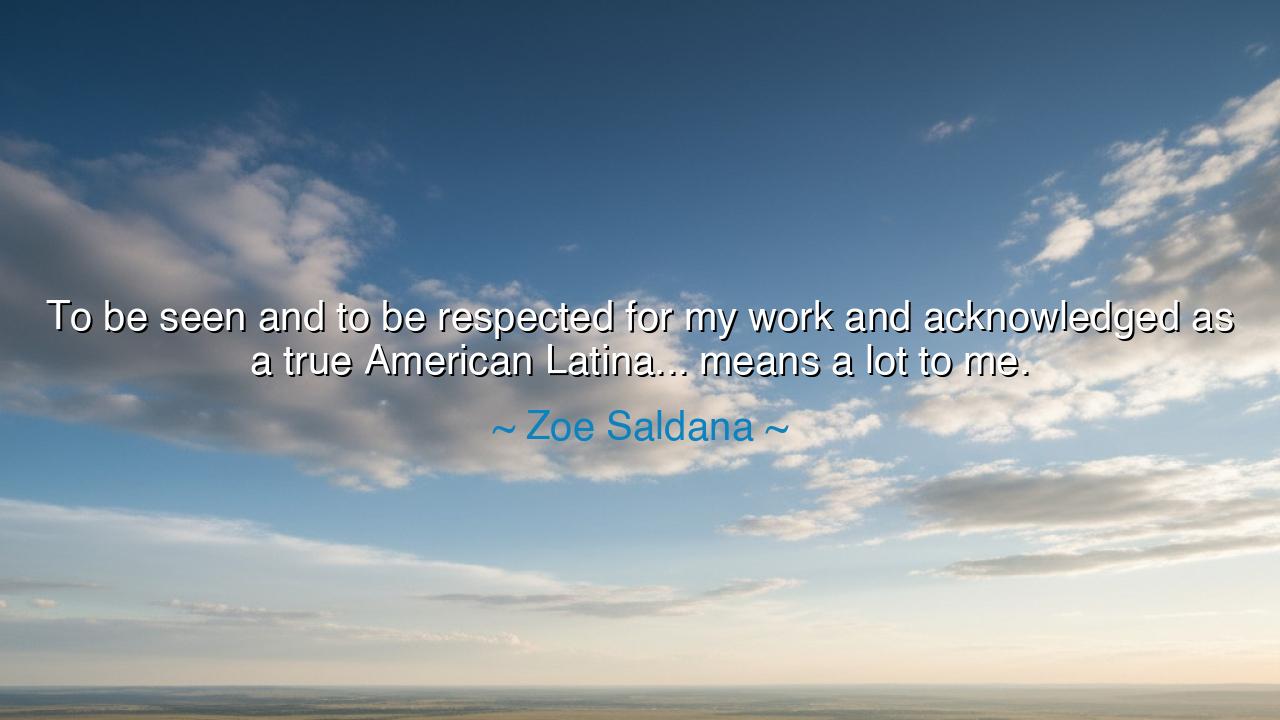
To be seen and to be respected for my work and acknowledged as a
To be seen and to be respected for my work and acknowledged as a true American Latina... means a lot to me.






In the words of the daughter of many worlds, “To be seen and to be respected for my work and acknowledged as a true American Latina... means a lot to me.” Thus spoke Zoe Saldana, whose journey through the arts became both personal triumph and cultural witness. Her saying rises from the longing of every soul: not only to labor, but to have that work honored; not only to exist, but to be truly seen.
The meaning here is layered with both pride and struggle. To be respected is no small thing, for it is the world’s recognition that dignity belongs to the laborer, not just to the labor. Yet for Saldana, the honor is doubled when tied to her identity as a Latina, a voice within the great chorus of America that has too often been silenced or overlooked. To be named and acknowledged as such is to affirm her place in a story larger than herself.
Her words unveil the tension between personal achievement and collective heritage. The work she has done on screen and stage stands as her offering, but her acknowledgment as a true American Latina binds her success to the pride of a people, showing that representation carries weight beyond individual fame. Thus, what she receives as honor, she also carries as responsibility.
The origin of this truth is found in her own path — a life straddling cultures, navigating both the world of art and the world’s gaze upon identity. Her testimony is not hers alone, but the echo of many who strive to be recognized both for what they do and for who they are. To future generations, her words are a reminder: the deepest honor lies not only in being celebrated for one’s work, but in being seen wholly, as both individual and as child of one’s people.






LTLuu Tam
Zoe Saldana’s perspective touches on something so powerful—the need for cultural visibility and respect. Being seen for both your work and your identity is incredibly validating. But, how often do we allow individuals to define their identity for themselves, especially in spaces where they’ve been historically marginalized? What can we do to ensure that respect for cultural diversity becomes a consistent practice, not just a trend?
VTPhu Vo Thanh
Zoe Saldana’s quote really resonates with me, especially her emphasis on being acknowledged as a true American Latina. It’s a reminder of how far we've come in breaking barriers, but also how much work remains to be done. What does true representation look like in media and entertainment, and how do we push for more diverse stories that reflect the richness of various cultures, especially in mainstream platforms?
TLtham le
I admire Zoe Saldana’s sentiment about being recognized not just for her work, but also as a proud Latina. It’s such an important part of self-worth and public perception. But it also raises the question: How do we create more spaces where cultural identities are embraced in a way that feels authentic and empowering, rather than being boxed into stereotypes or expectations?
VDvan doan
Zoe Saldana's words reflect how important it is to be acknowledged for both our work and our cultural identity. It makes me think about how often people of minority backgrounds struggle to be recognized for their talents without their heritage being minimized. How can we ensure that people from all backgrounds, especially those from underrepresented communities, are truly seen and celebrated for their full identities?